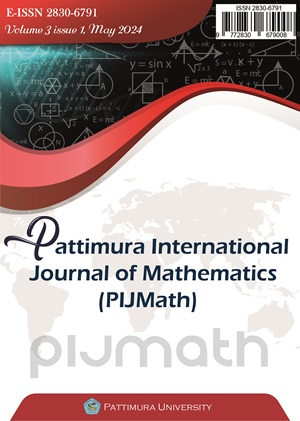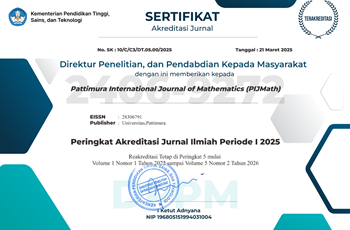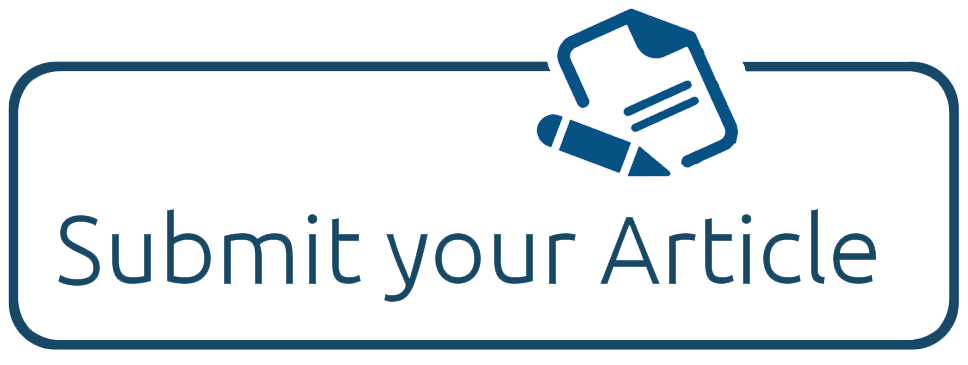Integration Of Computational Thinking In Mathematics Learning In Senior Secondary Education From 2019-2023: Systematic Literature Review
Abstract
Mathematical thinking is very important for everyone and must be trained from childhood to face and solve everyday problems. To overcome problems and adapt to changes that occur in the era of globalization, changes in the industrial revolution 4.0 The world of education must be able to act quickly and precisely. Computational Thinking (CT), also known as computational thinking, is a process that involves formulating problems and finding solutions, as well as using these solutions to process information effectively to solve problems. The first objective, of this research it is hoped that someone will find it easy to observe problems, find solutions to problems, solve problems, and be able to develop solutions or solutions to problems. Apart from that, computational thinking hones us to think more effectively and efficiently. Second, to obtain a theoretical framework that can help solve the problem being researched to reveal concepts relevant to the case, especially in research that studies more deeply about research.Integration of Computational Thinking in Mathematics Learning in Senior Secondary Education. Stages In this research there are five stages, formulating the problem (1), searching for literature (2), selecting appropriate literature search results (3), analyzing several literature from test results (4), and making conclusions (5). The results show that articles reviewed by researchers regarding Computational thinking are associated with technology namely, from 14 articles referring to 9 articles that passed QA.
Downloads
References
I. U. Machromah and W. S. Musthofa, “Students’ mathematical reflective thinking ability on statistics material with STEAM approach,” Al-Jabar J. Pendidik. Mat., vol. 14, no. 1, pp. 239–252, 2023, doi: 10.24042/ajpm.v14i1.16778.
S. Suherman and T. Vidákovich, “Assessment of mathematical creative thinking: A systematic review,” Think. Ski. Creat., vol. 44, p. 101019, Jun. 2022, doi: 10.1016/J.TSC.2022.101019.
R. D. Susanti, A. Lukito, and R. Ekawati, “Peirce’s Semiotic in Computational Thinking for Mathematical Problem-Solving Process,” J. High. Educ. Theory Pract., vol. 23, no. 16 SE-Articles, Oct. 2023, doi: 10.33423/jhetp.v23i16.6466.
R. Afif, C. N. Wali, and P. Sukoco, “The effect of the cooperative learning model on basketball games to improve junior high school students’ learning,” J. Sport Area, vol. 7, no. 2 SE-RESEARCH ARTICLES, pp. 287–299, Aug. 2022, doi: 10.25299/sportarea.2022.vol7(2).7808.
N. M. Dah, M. S. A. Mat Noor, M. Z. Kamarudin, and M. M. Ibrahim, “Facilitation of Student Questioning in the Malaysian Secondary Science Classroom Using the Investigable Questioning Formulation Technique (IQFT) Protocol,” Asia-Pacific Sci. Educ., vol. 9, no. 1, pp. 9–43, Jan. 2023, doi: 10.1163/23641177-BJA10063.
N. Kerimbayev, N. Nurym, A. Akramova, and S. Abdykarimova, “Educational Robotics: Development of computational thinking in collaborative online learning,” Educ. Inf. Technol., vol. 28, no. 11, pp. 14987–15009, 2023, doi: 10.1007/s10639-023-11806-5.
I. Kusmaryono and W. Kusumaningsih, “Evaluating the Results of PISA Assessment: Are There Gaps Between the Teaching of Mathematical Literacy at Schools and in PISA Assessment?,” Başlık, vol. volume-12-2023, no. volume-12-issue-3-july-2023, pp. 1479–1493, 2023, doi: 10.12973/eu-jer.12.3.1479.
L. M. Marc, O. Lévêque, C. Hardebolle, J. Dehler Zufferey, and I. Benitez Baena, Assessing Computational Thinking: Development and Validation of the Algorithmic Thinking Test for Adults. 2021. doi: 10.31124/advance.16685314.
J. Castaño Muñoz, R. Vuorikari, P. Costa, R. Hippe, and P. Kampylis, “Teacher collaboration and students’ digital competence - evidence from the SELFIE tool,” Eur. J. Teach. Educ., vol. 46, no. 3, pp. 476–497, May 2023, doi: 10.1080/02619768.2021.1938535.
R. Pamungkas et al., “Students’ achievement of the 21st century skills in the process of teaching and learning biology among science students,” JPBI (Jurnal Pendidik. Biol. Indones., vol. 9, pp. 293–300, Oct. 2023, doi: 10.22219/jpbi.v9i3.29203.
M. Auer, H. Hortsch, and P. Sethakul, The Impact of the 4th Industrial Revolution on Engineering Education Proceedings of the 22nd International Conference on Interactive Collaborative Learning (ICL2019) – Volume 1: Proceedings of the 22nd International Conference on Interactive Collaborative Learning (ICL2019) – Volume 1. 2020. doi: 10.1007/978-3-030-40274-7.
M. E. Auer, H. Hortsch, and P. Sethakul, The Impact of the 4th Industrial Revolution on Engineering Education: Proceedings of the 22nd International Conference on Interactive Collaborative Learning (ICL2019) – Volume 2. in Advances in Intelligent Systems and Computing. Springer International Publishing, 2020. [Online]. Available: https://books.google.co.id/books?id=HWLpzAEACAAJ
W. Bimayu and N. Nopriadi, “LEARNING BASED ON INFORMATION TECHNOLOGY AND LEARNING STRATEGY COMMUNICATION IN FACING INDUSTRIAL REVOLUTION ERA 4.0,” Int. J. Educ. Rev., vol. 1, pp. 77–86, Aug. 2019, doi: 10.33369/ijer.v1i2.8849.
W. S. Leung, M. Coetzee, D. Coulter, and D. Cotterrell, ICT Education: 50th Annual Conference of the Southern African Computer Lecturers’ Association, SACLA 2021, Johannesburg, South Africa, July 16, 2021, Revised Selected Papers. in Communications in Computer and Information Science. Springer International Publishing, 2022. [Online]. Available: https://books.google.co.id/books?id=RCFaEAAAQBAJ
M. Saini, E. Sengupta, M. Singh, H. Singh, and J. Singh, “Sustainable Development Goal for Quality Education (SDG 4): A study on SDG 4 to extract the pattern of association among the indicators of SDG 4 employing a genetic algorithm,” Educ. Inf. Technol., vol. 28, no. 2, pp. 2031–2069, 2023, doi: 10.1007/s10639-022-11265-4.
K. ALZUBİ, “Explore Jordanian mathematics teacher’s perception of their professional needs Related to Mathematical Proficiency,” Int. J. Educ. Res. Rev., vol. 6, no. 2, pp. 93–114, 2021, doi: 10.24331/ijere.835492.
A. Bounou, K. Lavidas, V. Komis, S. Papadakis, and P. Manoli, “Correlation between High School Students’ Computational Thinking and Their Performance in STEM and Language Courses,” Educ. Sci., vol. 13, no. 11, 2023, doi: 10.3390/educsci13111101.
M. Johannesen and L. Øgrim, “The role of multidisciplinarity in developing teachers’ professional digital competence,” Nord. J. Comp. Int. Educ., vol. 4, pp. 72–89, Oct. 2020, doi: 10.7577/njcie.3735.
L. El-Hamamsy et al., The competent Computational Thinking test (cCTt): a valid, reliable and gender-fair test for longitudinal CT studies in grades 3-6. 2023.
M. Benvenuti et al., “Artificial intelligence and human behavioral development: A perspective on new skills and competences acquisition for the educational context,” Comput. Human Behav., vol. 148, p. 107903, 2023, doi: https://doi.org/10.1016/j.chb.2023.107903.
D. Hooshyar and Y. Yang, “ImageLM: Interpretable image-based learner modelling for classifying learners’ computational thinking,” Expert Syst. Appl., vol. 238, p. 122283, 2024, doi: https://doi.org/10.1016/j.eswa.2023.122283.
S. A. Widodo, A. Wijayanti, M. Irfan, W. Pusporini, S. Mariah, and S. Rochmiyati, “Effects of Worksheets on Problem-Solving Skills: Meta-Analytic Studies ,” Başlık, vol. volume-9-2023, no. volume-9-issue-1-february-2023, pp. 151–167, Feb. 2023, doi: 10.12973/ijem.9.1.151.
A. C. Schwortz and A. C. Burrows, “Listening for Integrated STEM Discourse: Power and Positioning in a Teacher Professional Development Dataset Activity,” Educ. Sci., vol. 12, no. 2, 2022, doi: 10.3390/educsci12020084.
P. Chen, D. Yang, A. Metwally, J. Lavonen, and X. Wang, “Fostering computational thinking through unplugged activities- A systematic literature review and meta-analysis,” Int. J. STEM Educ., vol. 10, Jul. 2023, doi: 10.1186/s40594-023-00434-7.
N. Ismail and U. K. Yusof, “A systematic literature review: Recent techniques of predicting STEM stream students,” Comput. Educ. Artif. Intell., vol. 5, p. 100141, 2023, doi: https://doi.org/10.1016/j.caeai.2023.100141.
G. Lampropoulos, E. Keramopoulos, K. Diamantaras, and G. Evangelidis, “Augmented Reality and Gamification in Education: A Systematic Literature Review of Research, Applications, and Empirical Studies,” Appl. Sci., vol. 12, p. 6809, Jul. 2022, doi: 10.3390/app12136809.
A. Mukhibin and D. Juandi, “The Implementation of Computational Thinking on Mathematics Learning Research: A Systematic Literature Review,” Hipotenusa J. Math. Soc., vol. 5, no. 1, pp. 82–94, 2023, doi: 10.18326/hipotenusa.v5i1.9007.
F. Ari, I. Arslan-Ari, and L. Vasconcelos, “Early Childhood Preservice Teachers’ Perceptions of Computer Science, Gender Stereotypes, and Coding in Early Childhood Education,” TechTrends, vol. 66, no. 3, pp. 539–546, 2022, doi: 10.1007/s11528-022-00725-w.
D. Jawawi et al., “Nurturing Secondary School Student Computational Thinking Through Educational Robotics,” Int. J. Emerg. Technol. Learn., vol. 17, pp. 117–128, Feb. 2022, doi: 10.3991/ijet.v17i03.27311.
C. Avcı and M. N. Deniz, “Computational thinking: early childhood teachers’ and prospective teachers’ preconceptions and self-efficacy,” Educ. Inf. Technol., vol. 27, no. 8, pp. 11689–11713, 2022, doi: 10.1007/s10639-022-11078-5.
S. Psycharis and E. Kotzampasaki, “The impact of a stem inquiry game learning scenario on computational thinking and computer self-confidence,” Eurasia J. Math. Sci. Technol. Educ., vol. 15, no. 4, 2019, doi: 10.29333/ejmste/103071.
M. Lafuente Martínez, O. Lévêque, I. Benítez, C. Hardebolle, and J. D. Zufferey, “Assessing Computational Thinking: Development and Validation of the Algorithmic Thinking Test for Adults,” J. Educ. Comput. Res., vol. 60, no. 6, pp. 1436–1463, Feb. 2022, doi: 10.1177/07356331211057819.
Y. Zhang (张艺美) and A. Savard, “Defining Computational Thinking as an Evident Tool in Problem-Solving: Comparative Research on Chinese and Canadian Mathematics Textbooks,” ECNU Rev. Educ., vol. 6, no. 4, pp. 677–699, Mar. 2023, doi: 10.1177/20965311231158393.
J. del Olmo-Muñoz, A. Bueno-Baquero, R. Cózar-Gutiérrez, and J. A. González-Calero, “Exploring Gamification Approaches for Enhancing Computational Thinking in Young Learners,” Educ. Sci., vol. 13, no. 5, 2023, doi: 10.3390/educsci13050487.
I. Basson, “TWENTY YEARS INTO THE NEW MILLENNIUM: HOW INTEGRATED IS MATHEMATICS, PHYSICS AND COMPUTER SCIENCE AT SECONDARY SCHOOL LEVEL?,” Perspect. Educ., vol. 39, no. 4, pp. 3–26, 2021, doi: https://doi.org/10.18820/2519593X/pie.v39.i4.2.
D. Wang, L. Luo, J. Luo, S. Lin, and G. Ren, “Developing Computational Thinking: Design-Based Learning and Interdisciplinary Activity Design,” Appl. Sci., vol. 12, no. 21, 2022, doi: 10.3390/app122111033.
T. Hsu, “A Study of the Readiness of Implementing Computational Thinking in Compulsory Education in Taiwan,” 2019, pp. 295–314. doi: 10.1007/978-981-13-6528-7_17.
S.-C. Kong, “Learning Composite and Prime Numbers Through Developing an App: An Example of Computational Thinking Development Through Primary Mathematics Learning,” 2019, pp. 145–166. doi: 10.1007/978-981-13-6528-7_9.
C. Kálózi-Szabó, K. Mohai, and M. Cottini, “Employing Robotics in Education to Enhance Cognitive Development—A Pilot Study,” Sustainability, vol. 14, no. 23. 2022. doi: 10.3390/su142315951.
M. Ansori, Metode Penelitian Kuantitatif Edisi 2. Airlangga University Press, 2020. [Online]. Available: https://books.google.co.id/books?id=rKbJDwAAQBAJ
Copyright (c) 2024 Martini Martini, Neneng Aminah

This work is licensed under a Creative Commons Attribution-NonCommercial 4.0 International License.
The author(s) hold the copyright of the published article without restriction. This policy means that the journal allows the author(s) to hold and retain publishing rights without restrictions.
The author(s) holds the copyright of published articles without limitation. This policy means that the journal allows the author to hold and retain publishing rights without restrictions. Journal editors are given the copyright to publish articles in according to agreement signed by the author and also include statement of originality of the article


.jpg)












 This work is licensed under a
This work is licensed under a 